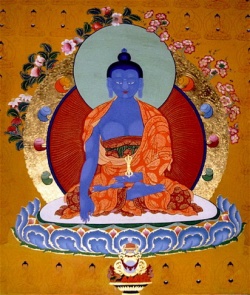Difference between revisions of "Akṣobhya Mantra"
(Created page with "thumb|250px| thumb|250px|a kṣo bhya Akṣobhya is the blue Buddha who sits in the eastern quarter. The name Akṣobhya mean...") |
|||
| Line 2: | Line 2: | ||
[[File:Aksobhyam.jpg|thumb|250px|a kṣo bhya]] | [[File:Aksobhyam.jpg|thumb|250px|a kṣo bhya]] | ||
| − | Akṣobhya is the blue Buddha who sits in the eastern quarter. The name Akṣobhya means immovable or imperturbable. His mudra is the bhūmisparśa or earth touching mudra. His emblem is the vajra, which sits balanced in his left hand; he is the head of the Vajra family. | + | [[Akṣobhya]] is the [[blue]] [[Buddha]] who sits in the eastern quarter. The name [[Akṣobhya]] means [[immovable]] or imperturbable. His [[mudra]] is the bhūmisparśa or [[earth touching mudra]]. His emblem is the [[vajra]], which sits balanced in his left hand; he is the head of the [[Vajra]] family. |
| − | Akṣobhya was probably the earliest of the Jinas to emerge. The Akṣobhyavyūha Sūtra describes his pureland Abhirati which translates as "delightful". Getting into Abhirati requires assiduous practice, unlike Amitabha's pureland which merely requires faith in Amitabha's vow to save all beings. | + | [[Akṣobhya]] was probably the earliest of the Jinas to emerge. The [[Akṣobhyavyūha Sūtra]] describes his [[pureland]] [[Abhirati]] which translates as "delightful". Getting into [[Abhirati]] requires assiduous practice, unlike Amitabha's [[pureland]] which merely requires [[faith]] in Amitabha's [[vow]] to save all [[beings]]. |
| − | '''mandala of the jinas''' | + | '''[[mandala]] of the jinas''' |
{|cellpadding="4" style="text-align: left;" | {|cellpadding="4" style="text-align: left;" | ||
|- | |- | ||
| − | |Position in mandala || east | + | |Position in [[mandala]] || east |
|- | |- | ||
| − | |Colour || blue | + | |Colour || [[blue]] |
|- | |- | ||
| − | |Family || Vajra | + | |Family || [[Vajra]] |
|- | |- | ||
| − | |Mudra || earth touching | + | |[[Mudra]] || [[earth]] touching |
|- | |- | ||
| − | |Wisdom || Mirrorlike Wisdom | + | |[[Wisdom]] || Mirrorlike [[Wisdom]] |
|- | |- | ||
| − | |Emblem || vajra | + | |Emblem || [[vajra]] |
|- | |- | ||
|Consort/prajñā ||Locanā | |Consort/prajñā ||Locanā | ||
| Line 26: | Line 26: | ||
==Seed Syllable== | ==Seed Syllable== | ||
===Bīja=== | ===Bīja=== | ||
| − | The bīja mantra hūṃ is shared by a number of Buddhas and Bodhisattvas, especially those associated with the Vajra family such as Vajrapāṇi, and Vajrasattva. | + | The [[bīja]] [[mantra]] hūṃ is shared by a number of [[Buddhas]] and [[Bodhisattvas]], especially those associated with the [[Vajra]] family such as [[Vajrapāṇi]], and [[Vajrasattva]]. |
{|cellpadding="8" style="text-align: center;" | {|cellpadding="8" style="text-align: center;" | ||
| Line 39: | Line 39: | ||
[[File:Akshobhyasiddham.png|frameless|450px|]] | [[File:Akshobhyasiddham.png|frameless|450px|]] | ||
{{clear}} | {{clear}} | ||
| − | ===Tibetan - Uchen=== | + | ===[[Tibetan]] - Uchen=== |
[[File:Akshobhya-uchen.jpg|frameless|450px|]] | [[File:Akshobhya-uchen.jpg|frameless|450px|]] | ||
{{clear}} | {{clear}} | ||
| Line 46: | Line 46: | ||
'''oṃ a kṣo bhya hūṃ | '''oṃ a kṣo bhya hūṃ | ||
| − | '''oṃ akṣobhya hūṃ | + | '''oṃ [[akṣobhya]] hūṃ |
{{R}} | {{R}} | ||
Revision as of 23:48, 3 September 2013
Akṣobhya is the blue Buddha who sits in the eastern quarter. The name Akṣobhya means immovable or imperturbable. His mudra is the bhūmisparśa or earth touching mudra. His emblem is the vajra, which sits balanced in his left hand; he is the head of the Vajra family.
Akṣobhya was probably the earliest of the Jinas to emerge. The Akṣobhyavyūha Sūtra describes his pureland Abhirati which translates as "delightful". Getting into Abhirati requires assiduous practice, unlike Amitabha's pureland which merely requires faith in Amitabha's vow to save all beings.
mandala of the jinas
| Position in mandala | east |
| Colour | blue |
| Family | Vajra |
| Mudra | earth touching |
| Wisdom | Mirrorlike Wisdom |
| Emblem | vajra |
| Consort/prajñā | Locanā |
Seed Syllable
Bīja
The bīja mantra hūṃ is shared by a number of Buddhas and Bodhisattvas, especially those associated with the Vajra family such as Vajrapāṇi, and Vajrasattva.
 |
|
| Siddhaṃ | Tibetan - Uchen |
Mantra
Siddhaṃ
Tibetan - Uchen
Transliteration
oṃ a kṣo bhya hūṃ
oṃ akṣobhya hūṃ



